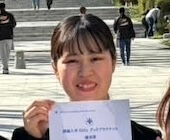めざせ食品ロスゼロ!「まもるカフェ」で環境問題の解決に貢献

大山未聖
経営学部経営学科4年
環境ビジネスを財務の視点から学んでいる野村ゼミでは、6年前から食品ロス削減プロジェクト「まもるカフェ」の活動を続けています。2023年度は初めて創大祭に「まもるカフェ」の模擬店を出し、食品廃棄物削減や資源循環の大切さを学内外にアピールしました。学問と実践の両面から環境問題に取り組む野村ゼミの大山未聖さんに、「まもるカフェ」の活動や成果についてお話を聞きました。
野村ゼミが行っている「まもるカフェ」とはどのような活動ですか?
「まもるカフェ」は、ゼミ生が自宅から消費期限が近付いた食材を持ち寄り、集まった食材だけで料理を作って食べることで、食品ロスの削減を図るプロジェクトです。食品ロスとは「本来食べられるのに捨てられてしまう食べ物」のことを言い、消費期限切れや食べ残し、野菜の皮を必要以上に取り除くことなどで発生します。
手つかずのまま捨てられてしまう食材を少しでも減らそうと、6年前に野村ゼミの先輩方が「まもるカフェ」を始め、現在は月1回ほどのペースでゼミ生が集まって活動しています。「まもる」には、地球と食の未来を守るという意味が込められています。
昨年の創大祭では「まもるカフェ」の模擬店を出して好評だったそうですね。創大祭の「まもるカフェ」の内容を教えてください。
普段の「まもるカフェ」は、捨ててしまう食材を持ち寄り自分たちで食べる活動ですが、創大祭の「まもるカフェ」では、廃棄される食品を減らすというテーマはそのままに、環境に配慮したコーヒーの販売にチャレンジしました。
環境への配慮という観点から、私たちがポイントにしたことが2つあります。1つ目は、提供するコーヒー豆やカップに環境配慮型の製品を使うこと。2つ目は、コーヒーを抽出した後に残るしぼりかすの再利用です。
1つ目については、オーガニック栽培のコーヒー豆と砂糖、サトウキビの搾りかすで作られた紙コップ、森林の持続可能性を高める商品に与えられるFSC認証のマドラーなどを使っています。コーヒー豆は、地域貢献の意味も込めて、八王子市内のコーヒー店で販売しているものを選びました。また、コーヒーのしぼりかすは、以前からゼミ活動でお世話になっている八王子市内の農家の方に肥料の原料として提供し、5.7㎏の食品廃棄物の削減に貢献することができました。

創大祭での「まもるカフェ」の活動で苦労したこと、工夫したことはありましたか。また、どのような成果や学びが得られたのでしょうか。
創大祭への出店は初めての試みだったので、手探りで準備を進めました。特に難しさを感じたのは、環境に配慮した製品の選択です。たとえば、商品の説明文に「サトウキビの搾りかすを使っています」とうたっている紙コップだったとしても、実際にはほんのわずかしか使っていないケースがあります。
「環境に配慮したコーヒーです」と自信を持って提供できるよう、エコな原料の配合割合や、より多く配合されている製品はないかなど、ゼミ生みんなで徹底的に調べ上げました。
環境配慮型の製品を使ったことでコストがかかり、授業で学んだ財務の知識を活かして損益分析を行い赤字が出ないよう少し高めの値段設定にしましたが、卒業生や保護者の方々をメインターゲットにすることで、目標販売額をクリアすることができました。
店頭で販売したバイオプラスチック製のオリジナルタンブラーには、大学の建物をデザインし、こちらも卒業生に好評でした。環境問題だけでなく、ビジネスやマーケティングの学びも生かすことができる取り組みになったと感じています。

コーヒーのしぼりかすは、提供した農家の方がコンポスト化し、畑の肥料となっておいしい野菜に生まれ変わりました。目標としていた食品廃棄物ゼロと、大学を起点とする資源循環を実現できたことは、大きな成果だったと思います。

多くの企業や団体が参加する環境展示会「エコプロ」にも毎年出展しているとお聞きしました。
エコプロでは例年、野村ゼミの実践プロジェクトの活動をPRしています。昨年のエコプロでは、「まもるカフェ」を疑似体験できるカードゲームを作り、来場した子どもたちに体験してもらいました。
10種類ほどの食材カードを用意し、それを全部使って3つの料理を考えてもらうゲームなのですが、たとえば「カレーを作ろうとしてもジャガイモのカードがない」といったように、一般的な料理の材料がそろわないカードの組み合わせになっているところが、このゲームのポイントです。
最初はみんな悩んでしまうのですが、私たちが代用できる食材をアドバイスし、食材を上手に使い切るアイデアを一緒に考えていきました。

普段から「まもるカフェ」の活動で大切にしていることは何ですか?
メニューを決めて材料を持ち寄るのではなく、あくまでも集まった材料から知恵を出し合って料理を作ることを大切にしています。また、あまり肩肘を張らず、仲間と一緒に楽しみながら考え、料理し、食べることで、結果的に食品ロス削減にも貢献できることも、「まもるカフェ」の魅力だと思っています。
エコプロのカードゲームでは、私たちが大切にしてきたその考え方を少しでも伝えられたら、という思いで取り組み、たくさんの子どもたちに楽しみながら学んでもらえたことがうれしかったです。
大山さんが野村ゼミでの学びや「まもるカフェ」の実践を通して、気付きを得たこと、自分が成長したと感じることはありますか?
創大祭の「まもるカフェ」の準備のため、さまざまなことを調べていくうちに、世界には私がまだ知らない環境問題に貢献できる取り組みがたくさんあることに気付きました。自ら知ろうとする姿勢の大切さをあらためて学ぶことができました。
また、私は人前に立つことが苦手だったのですが、創大祭やエコプロを経て、自分の言葉で相手に合わせた説明ができるようになったことに、自分の成長を感じます。それができるようになったのは、ゼミで学んだ知識を自分自身で実践し、体験したからです。知識を実践に移せる環境がある野村ゼミだからこそ得られた成長だったと思います。

野村ゼミや創大での学びを、今後どのように生かしていきたいですか?
野村ゼミでの学びをきっかけに、仕事でも環境問題に関わりたいと考えるようになり、自動車のリサイクルに携わる企業への就職を決めました。
大学で実践的に学んだ資源循環のシステムや環境ビジネスについての知識を生かし、持続可能な世界の実現に少しでも貢献していきたいと思っています。自動車のリサイクルについては、まだ知らないことも多く、卒業論文を通じて入社までに積極的に学んでいくつもりです。
最後に、創価大学をめざす後輩たちにメッセージをお願いします。
創価大学には、将来自分が進む道を決めるきっかけがたくさんあります。
私は野村ゼミに入るまで、環境問題への意識もそれほど高くなく、将来やりたいこともはっきりしていませんでした。しかし、ゼミで環境問題の深刻さを知り、解決のための知識を学び、それを「まもるカフェ」などで実践したことで、自分の成長を実感することができ、進みたい道を見つけることもできました。
ぜひ創価大学で仲間と一緒に楽しく学び、自分の道を見つけてください。

[好きな言葉]
ありがとう
[性格]
何事も諦めない、完璧主義
[趣味]
YouTube鑑賞
[最近読んだ本]
何者/朝井リョウ





